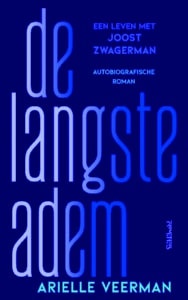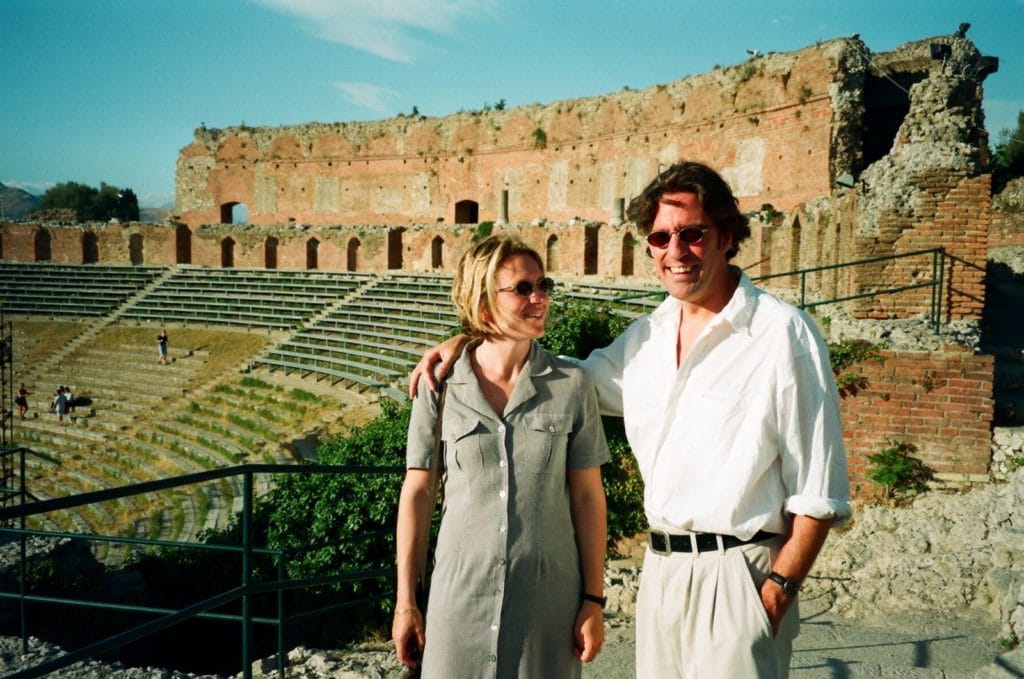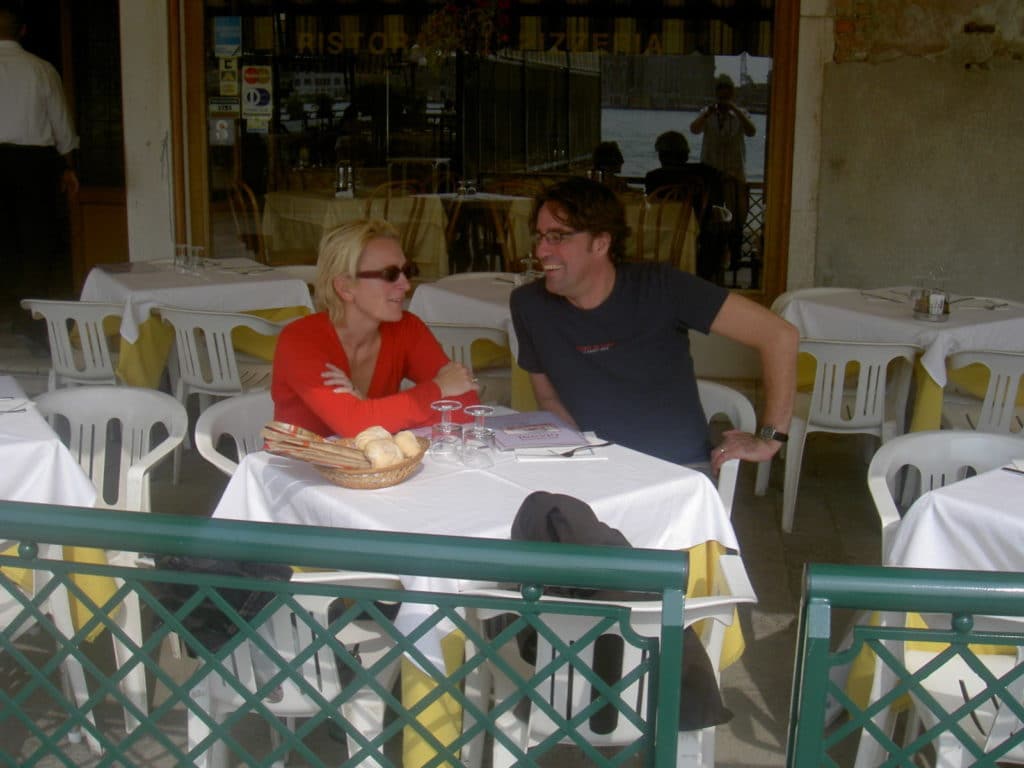An ambitious young writer turned Dutch celebrity - Joost Zwagerman's life was turbulent, as was his character. That his marriage ended in divorce after almost twenty years, he could not bear. A year later, on 8 September 2015 - so exactly five years ago today - he ended his life. In her book The longest breath looks back at his ex-wife Arielle Veerman. There appears to be no resentment, only sadness.

Why this book, why now?
'If Joost had been alive, I would not have written this book. Until two weeks before his death - we had been apart for four years by then and officially separated for a year - he was still fighting with me. I had learned to live with the accusing looks I got from all the stories he told about me. Then that's what they think - that had become my mantra. But after his death, I could no longer live with that. As Joost wrote in his book By its own hand turn suicides into killers of the bereaved. At the funeral, I felt that people thought I was the one who had pushed him over the ledge. The funeral was uncomfortable; I perceived suspicion and suspicion, no one spoke to me or the children, and we initially had to sit somewhere in the back. And what I found complicated: nobody mentioned Joost's difficult or gloomy sides during the speeches; it was one eulogy after another. I couldn't live with that one-sided picture, which is why I wrote this book. But above all, I wanted to delve into who I was, who Joost was, who we were together. And how that went wrong, with fatal consequences in the end. It is, I hope, more than just our story. It is also a story about illness, powerlessness and inability to make the right decisions in very difficult circumstances.'

You knew each other for 30 years and were in a relationship for almost 20 years, which started as a blinkered friendship in high school.
'That's right, in those days the contrast was great. Joost was very ambitious and driven, he wanted the world to hear from him. I was more philosophical and introverted by nature. When I went to study in Italy and then stayed there to work as an art restorer, we didn't see each other for ten years - he visited me once in Florence. In his debut novel Gimmick! he had turned me into a rather hysterical character. I thought that was funny, and it was a good book. But apart from that, I didn't particularly care for him. The Netherlands was far away for me at that time.'
Until you fell in love with each other during a brief visit to the Netherlands in 1991. What attracted you to him?
'The pushy and uncontrolled Joost I knew from high school had grown into articulate, handsome boy. Quiet and confident. We could talk to each other and laugh a lot together, shared the same passions, like art and music. He told me about Dutch politics and literature, we went out a lot - something I didn't do in Italy either - and I was included in his warm circle of friends, with writers like Adri van der Heijden and his wife Mirjam Rotenstreich. The first ten years together were our best years. We had three strong, beautiful children. And with that, our relationship began to change.'
Parenting
What happened?
'Only while writing my book did I see clearly how threatening having children must have been for Joost. We had stepped in without clear agreements, so when our eldest son was born, it raised the question: how do we divide the care? Joost began to see the family as a threat to his work, increasingly saying that real writers didn't have children. "Do you see writers in the schoolyard?" he replied when I asked him if he could pick up our son from school.

I was in great awe of artists in general, and certainly of Joost. He was an erudite man. I admired everything he put down on paper and how he went wild on his keyboard. I wanted to support him in that. So soon I thought: OK, I'll take care of this daily routine. That interfered with my own life; Joost thought I shouldn't work. But as the family expanded - we had another son and a daughter - the pressure on him also increased, because our family was largely financially dependent on him. Joost was keenly aware that only a handful of writers could live off their pen, and he was one of them. The question of whether he would be able to do that every year must have caused him a lot of anxiety.'
Fame
Gradually, he seems to identify more and more with his success. Did fame become an end in itself for Joost?
'I think Joost lost sight of his true self and started identifying with his fame. He wanted it badly but didn't know how to use it, even though a lot in his life revolved around that. Joost became increasingly unreachable. If I wanted to discuss anything with him about taking care of the children, I was told: 'You're married to a writer, deal with it.' He was also hardly physically present; he sat a lot in the study he had at another place in town. Meanwhile, he was becoming increasingly dissatisfied. Dissatisfied with the life he was leading, dissatisfied with me and my social life. This led to violent tantrums. Around 2006, our relationship began to harden. The atmosphere became grim.'
How did you deal with that?
'I found that difficult and started living my own life more and more. We became two separate entities, watching each other from some distance. He didn't want to go to therapy; as far as he was concerned, the fault lay with me and I had to adapt. Although he himself regularly said he wanted a divorce, in retrospect I think he called it out to get me in line. He had more and more trouble with my friendships, he preferred me to sit on the sofa day and night, ready to read what he had written. Everything revolved around him, my needs no longer counted. It felt like I was slowly being erased. They were lonely and anxious years. For him too, I think.
I did not dare to stand up for myself, for fear of what would happen if I left him. But also because I wasn't taught that from home; as a woman, you had to adapt. So I let it happen, didn't call a halt to him. Until I could go no further. Yet I only dared to actually take the step when I met another man with whom I fell in love. That gave me the final push and in 2011 I told Joost that I wanted a divorce. If I could turn something back, that would be it: if only I had left Joost before I met Hugo, because that made everything worse. His reaction was so intense that I began to suspect that something really serious was going on with him.'

Why was he so mortified?
'I am not sure, of course, but I suspect he felt that his life had failed; that he had failed. It perhaps bothered him that he would decline in status and would henceforth be 'a divorced man'. He perceived that as a disgrace. And the fact that the children would mainly continue to live with me naturally grieved him too. If you got Joost against you and he started considering you an enemy, you really had a problem. That happened to several of his friends and colleagues, now it was happening to me. He literally said that to me as well.'
His anger grew into hatred, slander and stalking.
She nods silently, visibly emotional. 'Yes, that was the most difficult thing. The lawsuits over our divorce were an abomination, but the worst thing was his emails, day after day, accusing me of the most terrible things. He called me selfish and greedy. Everything I did was wrong - everything. I have binders full of such emails. And he spoke about me that way to others too. No one contacted me anymore, so his stories about me went unchecked. You are powerless to do that. Besides, fame is always right. After all, someone who appears on television and is so eloquent is not going to tell lies, is he? I think honesty is allowed. I feel compassion and empathy for Joost, but I also feel very sorry that he really left our children - and his fourth child with his girlfriend. There was a lot that was great about Joost, but this was him too.'
How did you hold yourself up in that storm?
'Hugo was there. With him I was able to discuss everything, to this day - still every day we talk about Joost, now again because of my book. My family and friends also rallied around me. I picked up my work and that gave me a sense of autonomy. If I was ignored by someone again, I trained myself with that mantra: then people just think that.'
Overgrown by ivy
What is it like to be considered by some as the woman who caused his suicide?
'No one literally said it like that to me, but sometimes I felt that way. That was terrible. Joost was sick, long before he became depressed and before he ended his life. He was no longer himself; like he was overgrown by ivy. That ivy was his depression, his hatred and especially his fears, because I think Joost was very scared. For instance, he was afraid of bankruptcy and thought we would all perish in poverty. He tried to keep all that under his hat, and he succeeded very well. By giving interviews at the right time, he managed to successfully influence perceptions.'
Forgiveness
Are you afraid of what reactions your book will trigger?
'People who think badly of me will probably continue to do so. But the people I have had it read to so far think it is a book of integrity. What I claim can be factually proven. I don't do mud-slinging, I didn't write this book out of vindictiveness. But those accusatory looks at me went too far for me. I do hope that I was able to take our story to the next level. Because it's not just about Joost Zwagerman versus Arielle Veerman. It's about the bigger story. A story about how you lose grip on life - something that can happen to anyone. About issues surrounding mental illness and how those around you deal with them. About how you can forgive someone.'
Have you forgiven him?
'Yes. I thought Joost was a huge problem at one point, but fortunately I never came to hate him. Because I saw there was something wrong with him and could feel compassion for him. I think the most honest thing is to acknowledge that Joost, besides being a literary man, an opinion maker and a publicist, also had this side. And to be able to embrace him nevertheless.'
Your book is called The longest breath, a title taken from an email to a friend in which Joost said he was going to destroy you: 'And you know it, I always win, because I have the longest breath'. Why did you name the book that way?
'Because of everything this has brought about for me: suspicion, insecurity, the stigma he has put on us, on me, as if I am complicit in his death. I'll probably never get rid of that stigma.'
Did he indeed win from you?
'This is not a story of winners. This is the story of only losers.'
